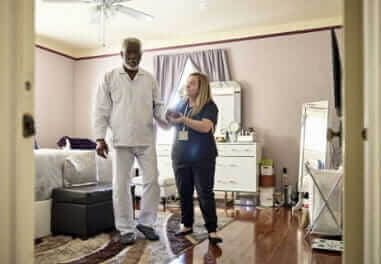Looking for In-Home Care? See All Services
Our Caregivers Have Advanced DementiaWise® Training to Support People with Alzheimer’s and Other Forms of Dementia
When a loved one begins to experience memory loss, every day can bring new questions and uncertainties. At ComForCare Canada, our specialized dementia care services are designed to bring clarity, comfort, and support — not only for individuals living with dementia but also for the families who care for them. Through our personalized in-home care approach, we help clients maintain routines, stay safe, and live with dignity in the place they know best: home. Whether you're navigating the early stages of dementia or facing more advanced needs, our trained caregivers are here to provide consistent, compassionate support tailored to your unique situation.
Whether you need long-term care options, specialized memory care, dementia respite care for temporary relief, or simply a helpful hand with daily activities and meals, our team has access to a wealth of information free of charge. Explore our care resources below to learn more, or call us at (800) 886-4044 to speak with your local ComForCare Canada office directly.





At ComForCare Canada, we don’t believe in one-size-fits-all care. That’s why our dementia care services are guided by DementiaWise® — our evidence-informed approach to supporting individuals with dementia in ways that promote safety, connection, and quality of life. This program is recognized for its best practices in dementia care and empowers our caregivers to deliver support that’s personalized, respectful, and rooted in proven techniques. Whether your loved one is in the early stages of memory loss or needs more advanced assistance, we’re here to help — with care that adapts to their needs and honours who they are.
Personalized In-Home Support
We develop customized care plans based on each client’s routines, abilities, and preferences — ensuring familiarity and comfort in their own home.
Trained Dementia Caregivers
Our caregivers receive specialized dementia care training, including techniques for managing confusion, agitation, and changes in communication.
Cognitive Engagement Activities
We offer meaningful daily activities such as music, puzzles, storytelling, and memory games that stimulate cognitive function and promote emotional well-being.
Safety Monitoring & Fall Prevention
We help reduce risks in the home with safety-focused support — from fall prevention techniques to gentle reminders and assistance with mobility.
Daily Living Assistance
Our caregivers help with personal care tasks such as bathing, dressing, grooming, and meal preparation, always with respect and compassion.
Routine & Schedule Management
Consistent daily routines reduce anxiety for individuals with dementia. We help maintain structure around mealtimes, medications, sleep, and social activities.
Family Communication & Support
We keep families informed and supported with regular updates and coordination, helping everyone feel more confident in the care process.

ComForCare Canada is here to help you and your loved ones cope with memory loss and the symptoms of dementia and Alzheimer’s disease. Our caring advisors have patience in understanding dementia behaviors, as well as a genuine passion for nurturing a family-caregiver alliance. Our care providers work with you to develop strategies for your loved one’s daily routine and self-care. And we’re always here to answer questions, provide resources, and share insights about in-home care!


Each office is independently owned and operated
and is an equal opportunity employer.
© 2026 ComForCare Franchise Systems, LLC.
Contact Us
(800) 886-4044